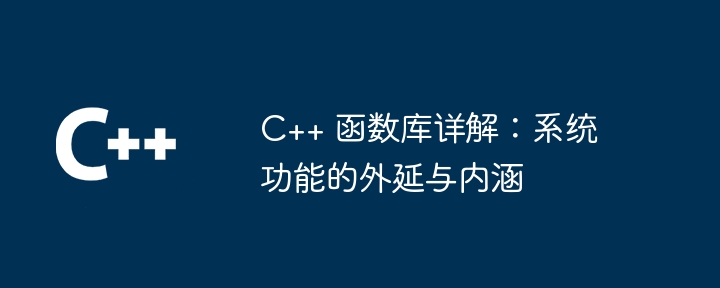Home >Backend Development >C++ >Detailed explanation of C++ function library: extension and connotation of system functions
Detailed explanation of C++ function library: extension and connotation of system functions
- 王林Original
- 2024-04-30 13:42:011020browse
The C function library provides predefined functions and classes that extend the functionality of C and simplify programming, giving applications additional capabilities. These function libraries cover a variety of tasks from file operations to system calls. A common use case is to use the fstream function library to implement file reading and writing, for example, reading and displaying the contents of a text file.

Detailed explanation of C function library: extension and connotation of system functions
C function library is a set of predefined functions and classes , they offer a wide range of features that greatly simplify programming and increase productivity. These libraries give applications greater capabilities beyond their basic functionality, enabling them to perform a variety of system-level tasks.
Function extension of the C function library
The C function library extends the built-in functions of the C language and provides ready-to-use solutions for the following tasks:
- File and stream operations (ifstream, ofstream)
- Memory operations (new, delete)
- Input/ Output (cin, cout)
- Error handling (exception)
- Mathematics and trigonometric functions (math.h)
- Time and date operations (chrono)
- Containers and algorithms (vector, algorithm)
These libraries provide standardization A portable, portable way to perform these tasks, simplifying code writing and maintenance.
The connotation of C function library
In addition to extending language functions, the C function library also provides access to the underlying mechanisms of the system, such as:
- System call (sys/syscall.h)
- Process management (fork, exec)
- Multi-thread programming ( pthread)
- Network Programming (socket)
These function libraries allow programmers to interact directly with the operating system and hardware to perform advanced system programming tasks .
Practical case: file reading and writing
Let us use the fstream function library to write a program to read and display the contents of the file:
#include <fstream>
#include <iostream>
using namespace std;
int main() {
// 打开文件
ifstream fin("input.txt");
// 检查是否成功打开
if (!fin.is_open()) {
cout << "Error opening file" << endl;
return -1;
}
// 读取文件内容
string line;
while (getline(fin, line)) {
cout << line << endl;
}
// 关闭文件
fin.close();
return 0;
}This program uses the ifstream function library to open a text file, read its contents, and display it on the console.
The above is the detailed content of Detailed explanation of C++ function library: extension and connotation of system functions. For more information, please follow other related articles on the PHP Chinese website!

